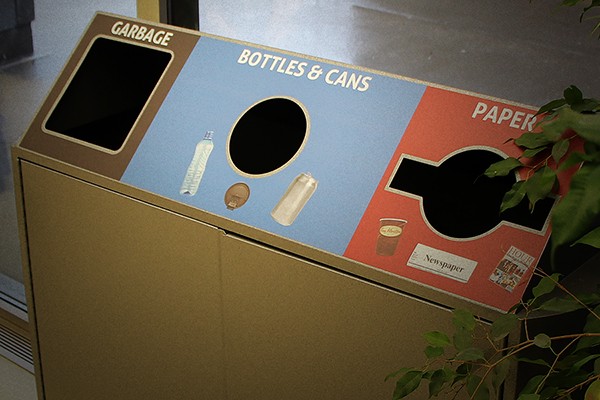 New recycle stations across campus represent an investment in the University's efforts toward environmental responsibility.
New recycle stations across campus represent an investment in the University's efforts toward environmental responsibility.
An investment of nearly $400,000 in recycling stations over the past eight years has been a great leap forward in UWindsor’s efforts to be more environmentally responsible—though there is still one thing missing, according to John Regier, manager of environmental services.
“We just need people to sort their waste and put it in its proper place,” he says. “We have recycling stations in virtually every classroom and our collection rates could be even better if all users took a few seconds to consider how they use the bins.”
Regier says custodians do a great job of sorting the few stray items that find their way into the wrong container, but too many can mean that a bag of potential recyclables has to be thrown away as trash.
“We do an annual waste audit and our next project is to re-label our recycle stations to get better compliance,” he says. “We have a system that is comparable to most universities and in some areas we do better than others, but we are always looking for ways to improve.”
Where the university really shines, Regier says, is in its collection of 95 percent of such e-waste as computers and televisions, as well as construction debris and metal recycling from old office furniture.
“For example, if a lab is going to update all of their computers, the purchasing department is notified and IT can take the hard drives and wipe them. We are then notified of computers for disposal and we take these bulk items and ensure they are properly recycled and sell our e-waste to a company that will strip them and separate plastics from valuable metals.”
The campus community may also be surprised to know that environmental services composts its own yard waste in a designated lot near California and College avenues. A considerable amount of the compost is used on campus, with overflow transferred to the City of Windsor’s compost heap as necessary.
Regier says he also has an eye to establishing a clean, safe method of food composting with high student involvement.
“That’s our next project, but we’ve come a long way in just the past decade,” he says. “The university has a real interest in this and we are committed to recycling as much as we can, no matter what it is. There will always be room for improvement, but we are putting in a lot of effort and we are always game to try new things. If people have suggestions we are keen to hear them, and if possible we will make them happen.”
Editor’s note: This is the second in a series of articles celebrating the University’s environmental stewardship, leading up to Earth Day, April 22.
